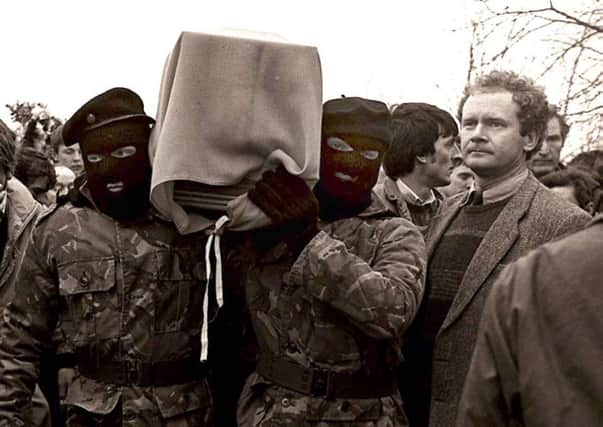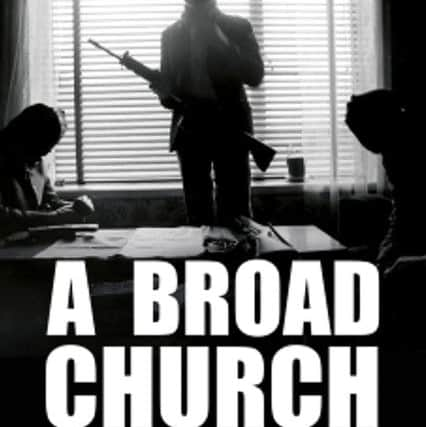Republic of Ireland played integral role in supporting IRA, says historian


Gearóid Ó Faoleán spent his Phd at the University of Limerick gathering evidence of active support for the IRA from all southern political parties, members of the Gardai, Irish Defence Forces, civil service, judiciary and GAA.
And now after living in London for three years he has added to that the British dimension of the story, after plundering the Public Records Office at Kew.
Advertisement
Hide AdAdvertisement
Hide AdSurprised by the breadth of support for the IRA in the Republic that he uncovered, his new book is named ‘A broad church’.


He intends his book to bring academic balance to current discussions focusing on the role of the British state in the Troubles, and to open a window that is rarely looked at.
Advertisement
Hide AdAdvertisement
Hide Ad

“This is something that the book aims to do, is to put the Troubles in context,” he told the News Letter. “It wasn’t an isolated thing that happened in Northern Ireland and it wasn’t because of people on both sides in Northern Ireland who were fuelling this. It was certainly being fuelled by people in the Republic of Ireland, as well as other countries.”
The IRA could not have survived so long - claiming almost 1,800 lives - without persisting support from the Republic, he says.
Advertisement
Hide AdAdvertisement
Hide Ad“I think this will shine a light particularly when people look at the longevity of the IRA’s campaign. It will shine a light in showing that the south, willingly or unwillingly, was an engine for the IRA; logistically in terms of arms coming in, training, the acquisition and production of explosives and in terms of financing - the south was all of that.”
Successive Irish governments struggled to maintain a balance of cooperation with the UK whilst appeasing nationalist sentiment among the population – and their own parties, he said.
Originally from Shannon in Co Clare, he had his eyes opened to IRA support in the Republic during his undergraduate history degree, when he investigated the high number of people from Northern Ireland living in his area.
The most surprising aspect of his Phd was his finding that - contrary to common perception - the IRA was not mainly funded from the US, but actually from the Republic.
Advertisement
Hide AdAdvertisement
Hide Ad“This idea that America and Noraid were funding the campaign is not true. Maybe 12% of IRA funding came from North America. The majority came from the south and mostly from bank robberies.”
In 1978 there was almost one bank robbery every second day in the south, and in the early seventies, there was widespread public sympathy for the raids.
“In the early years there was a Robin Hood element among a large part of the public,” he said, but as the robbers became more violent, public support later drained away.
Another factor that surprised him was that hundreds of IRA volunteers were trained in secret camps across every province often overseen by a former member of the Irish Defence Forces.
Advertisement
Hide AdAdvertisement
Hide AdThe introduction of juryless courts in the 1970s was not because juries were being intimidated by the IRA, he discovered; they had been “acquitting republicans” and openly celebrating in court.
“The only way we can really deal with the Troubles is to talk about it and if it is not even being taught in schools, if people are not really aware of it... in the Republic, if it is not really on the curriculum, how are people ever going to be able to engage with it?”
He adds: “Officially there is a denial, it sounds like a cliche, but among the Dublin media, that it is not talked about. But what was really interesting during my Phd was that anytime I mentioned what I was studying people were very interested. But that interest, it seems, is never reflected in the news or documentaries... successive [Irish] governments have certainly not wanted to address it.”
The demographic who are open to discussing it, he says, are people in their 30s or 40s. “They seem to be the people who really want to know because they felt that they missed out on the way government and the media was not willing to shine a spotlight on it.”
Advertisement
Hide AdAdvertisement
Hide AdThose who actively supported the IRA were eager to get their story on record as censorship kept Sinn Fein off the Republic airwaves in the south during the Troubles.
Those he interviewed, which included Sinn Fein TDs, spanned people who were unapologetic to those who felt their contribution was not worth it in light of the fact that Sinn Fein had “sold out”.
But nobody he spoke to regretted getting involved. “A lot of them cited that it was because of Bloody Sunday or internment that they got involved... they felt it was the right thing to do at the time in response to events.”
From the political establishment, to the civil service, the security forces – even the GAA – publisher Merrion Press says the new book offers “startling revelations” on just how integral the Republic was to the Provisional IRA’s campaign;-
Advertisement
Hide AdAdvertisement
Hide AdGovernment action - Successive Dublin governments struggled to maintain cooperation with British counterparts whilst appeasing nationalist sentiment. Taoiseach Jack Lynch told a British ambassador that certain named Irish judges were being “bad” or “weak” on the IRA.
The introduction of juryless courts was largely driven by the fact that republicans were being acquitted by local judges and juries.
In a number of cases juries cheered the acquittal of republicans and shook their hands after the trial. Among cases dismissed in one form or another in 1971 were;- Peter Donnelly, who was charged in Clones with having a Thompson sub-machine gun; an extradition application in Monaghan for three Dungannon men on bail from NI on explosives charges; and four men who fired at the British Army across the Louth/Armagh border.
Support - Members of all major political parties in the Republic provided active IRA support in the 1970s. The illegal 1973 IRA booklet, Freedom Struggle, was published in Drogheda by somebody referred to by the government as ‘a prominent Fianna Fáil member’. Four Irish soldier were convicted of stealing explosives from McGee Barracks in 1974; a Garda passed police documents to republicans after Bloody Sunday and a civil servant was charged with passing files to the IRA in 1975.
Advertisement
Hide AdAdvertisement
Hide AdTraining - From 1971, hundreds of IRA volunteers passed through training camps but less than twenty were ever prosecuted. Once inn rural Munster, IRA volunteers reportedly went down to the local village for cigarettes armed and in full uniform without fear of Garda.
Training ranged from basic small arms and explosives manufacturing to heavy machine guns, overseen by a former member of the Irish Defence Forces.
Arming - Shannon Airport and Cork and Cobh harbours were used extensively by the IRA for arms importation during the early 1970s aided by sympathetic workers on-site.
Gelignite stolen from quarries, farms and construction sites in the Republic was behind the 48,000lbs of explosives detonated in NI in the first six months of 1973 alone.
Advertisement
Hide AdAdvertisement
Hide AdOne IRA arms factory near the Stannaway Road, Dublin, was producing six firearms a day in 1973. A Garda report on another, discovered in the County Dublin village of Donabate in 1975 stated: ‘it was a centre for the manufacture of grenades, rockets and mortars. The Provisionals were careful to work “nine to five” hours in order not to attract suspicion.’
The GAA - the 1974 annual congress unanimously voted to campaign for the reinstatement of civil servant Donal Whelan who was sacked after being convicted of attempting to smuggle five tons of weaponry.
Ulster Unionist Party Justice Spokesman Doug Beattie says the new book will help ‘redress the balance’ in how the story of the Troubles is currently being recounted.
“A Broad Church’ will help redress the imbalance in how the story of the Troubles has been told, and in particular the extent to which the IRA was able to make use of the territory of the Republic of Ireland to support its murderous activities north of the border,” he said.
Advertisement
Hide AdAdvertisement
Hide Ad“This book will help address the selective amnesia at play in the Republic regarding its role during the Troubles. For decades the IRA was able to mount cross border raids almost at will, and murder hundreds of people as part of an ethnic cleansing campaign of border protestants. The Republic was also the source of numerous arms dumps and training camps. It is also a fact that the 30 year IRA campaign could not have been sustained had there not been support – both overt and tacit – from a significant section of the population there.
“The most uncomfortable aspect of the past for the Dublin Authorities is the extent to which the IRA received support and assistance from the political class, elements of the judiciary and sections of the police. The media and Dublin Government are quick to rush to judgement regarding claims of collusion between the British State and loyalist gangs, but are nowhere to be seen when it comes to an honest appraisal of the role played by the Dublin Government, its state actors and some of citizens in facilitating the activities of the IRA.”
If the book shines a light on facts which Dublin would rather not be reminded of, he said, then it will be “a very useful addition indeed”.
• ‘A broad church’, the Provisional IRA in the Republic of Ireland 1969-1980’ by Gearóid Ó Faoleán (Merrion Press) £17.99 from Waterstones Belfast or online booksellers.
Advertisement
Hide AdAdvertisement
Hide Ad